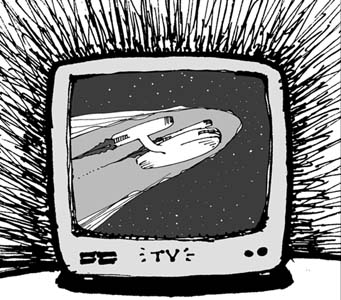![[Metroactive Features]](/features/gifs/feat468.gif)
[ Features Index | San Jose | Metroactive Central | Archives ]
Trek Memories
Computer, literary and sci-fi geeks have one thing in common
By Annalee Newitz
THERE'S MORE THAN ONE WAY to be a nerd, and I took 10 years out of my life to pursue possibly the world's most arcane form of nerdonomy: I got a Ph.D. and became, for one brief year, a professor of English and American studies. After a decade in UC-Berkeley's Doe Library, soaking up the slow drip of printed knowledge, it's no wonder that I ached to download texts and images at the speed of a T3. But that's another story.
Ironically, my memories of graduate school all seem to revolve around Star Trek: The Next Generation (known to fans as ST:TNG). Even as I was reading about the Battle of Maldon in Old English and familiarizing myself with the racial allegories in Moby-Dick, I also managed to learn a valuable lesson about television for nerds. It all started when this mysterious, brilliant classmate--who become a very close friend for several years--invited me to his house for the third season premiere of the show.
I was 20 years old and had never watched much television. My parents were liberal literary types who tossed out our tube right after Wonder Woman went off the air. And, as a first-year graduate student in the Highest-Ranked English Graduate Program in the Country, I had imagined that television was beneath me. But then I entered Joe's darkened living room--full of other young intellectuals whom I had only known from our classroom discussions of Jacques Lacan and Karl Marx and Fredric Jameson--and saw what I had been missing for all those years without TV. It was a world full of cheesy aliens and laser battles and occasionally clumsy ethical principles. It was a universe of stories about how work and fulfillment could be wedded, even if it required warp drive and replicators.
Perhaps you could even say I had a sublime experience of universal nerdliness: I had finally discovered a narrative that bridged the gaps between computer geeks and literary theory geeks and science geeks and sci-fi geeks and sociology geeks and whatever other kind of geek you care to place in the dork taxonomy. What ST:TNG spoke to in all of us was the feeling that working with your brain, using it to "seek out strange new worlds," could be liberating.
Let me first get something out of the way before I wax too rhapsodic: I think the old generation Star Trek sucks. I'm sorry, I know it meant a lot to a bunch of you who either watched it on rerun or lived through the 1960s. But what made ST:TNG so fascinating to me (and entertaining, dammit) was its lofty aspiration to moral rectitude and humanism. ST was largely about Captain Kirk's pecs and really the only interesting part was speculating about his secret love affair with Spock. But that's another story.
Captain Picard of ST:TNG had ethics, not pecs. He was always vainly trying to hold to the Prime Directive of the United Federation of Planets (and often failing). But the very idea of the Prime Directive was a good one--it was the ultimate anti-imperialist agenda, and appealed to my sense of nerd-topian rationality. The goal of the Enterprise as it plunged through space and explored was to discover but not to touch unless invited. Very consensual. And the Prime Directive made all this possible by stating that the Enterprise crew was not allowed to make contact with any civilization that had not yet achieved faster-than-light travel through space. That way, nobody could take advantage of any group of beings by lording it over them with technology--the way, say, Europeans did in the Americas.
Like I said, very anti-imperialist. Go explore, but don't fuck around with groups who can't defend themselves. It was enlightened science.
Like thousands of other nerds, I fell in love with ST:TNG because it offered me a utopian vision of brainy heroism and teamwork. And the show's main characters all seemed to agree that science and specialized knowledge should not be used for personal gain or for exploiting other groups.
Constance Penley, another person I met in academia, once wrote that she wished Star Trek values could be wedded to NASA's power. Sounds like a good idea to me.
[ San Jose | Metroactive Central | Archives ]
![]()

Illustration by Jeremy Russell
From the May 4-10, 2000 issue of Metro, Silicon Valley's Weekly Newspaper.